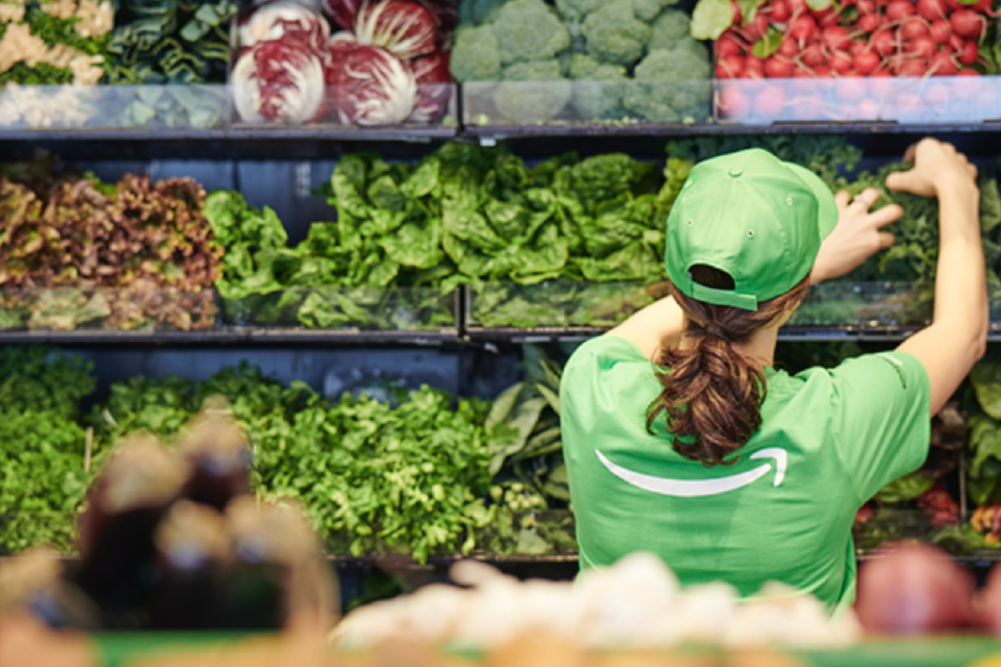 KANSAS CITY — Jeff Bezos’ transition from chief executive officer of Amazon.com, Inc. to executive chairman in the third quarter of fiscal 2021 will allow him to “be involved in many large one-way-door issues” and to lead important decisions around Amazon’s overall strategy, acquisitions and “going into grocery,” the company said. The fact Mr. Bezos and Amazon continue to make grocery a priority underscores its ongoing importance to the world’s largest online retailer and shows further dramatic changes to the marketplace may be on the way.
KANSAS CITY — Jeff Bezos’ transition from chief executive officer of Amazon.com, Inc. to executive chairman in the third quarter of fiscal 2021 will allow him to “be involved in many large one-way-door issues” and to lead important decisions around Amazon’s overall strategy, acquisitions and “going into grocery,” the company said. The fact Mr. Bezos and Amazon continue to make grocery a priority underscores its ongoing importance to the world’s largest online retailer and shows further dramatic changes to the marketplace may be on the way.
The comment about “going into grocery” came during a Feb. 2 conference call to discuss the company’s fiscal 2020 earnings, and those results were dramatic. For the year ended Dec. 31, Amazon.com’s net income totaled $21.3 billion, equal to $42.64 per share on the common stock, an 84% increase from the year prior when the company earned $11.6 billion, or $23.46 per share.
Fiscal 2020 net sales totaled $386 billion, a significant increase over fiscal 2019, when net sales were $281 billion.
The “going into grocery” comment also dampened speculation about the potential for a shift in strategic priorities at Amazon under Andrew R. Jassy, who will become CEO. Currently the CEO of Amazon Web Services, the company’s rapidly growing information technology business unit, Mr. Jassy may take Amazon in new directions. Still, it is clear the company’s grocery business remains top of mind.
Amazon’s prowess in online retailing is undeniable, and the pandemic has accelerated the company’s growth. Adding to its prowess is management’s willingness to test new brick-and-mortar store formats. Amazon Go and Amazon Go Grocery are app-based stores that allow customers to shop and pay without going through the traditional checkout line. Another store format, Amazon Fresh Grocery, is designed to create a seamless shopping experience whether customers are shopping in store or online, according to the company.
Amazon’s ascendance as a leader in grocery increasingly has been recognized. In January, the data science company Dunnhumby released its annual Retailer Preference Index, which ranks the retailers best positioned to win with customers over the long term. Amazon claimed the top spot for the first time, moving up from third place last year.
This year’s index took such traditional attributes as pre-COVID financial performance and consumer engagement and trust into consideration, but also factored in what Dunnhumby called COVID momentum, which compared a retailer’s financial performance during the pandemic to its pre-pandemic performance.
“When looking at Amazon’s strengths, it is clear why they are first this year,” Dunnhumby said. “Amazon occupies a clear price-first position, ranking 11th out of the 56 retailers in our study on price, ensuring a strong value core. They also are second in speed and first in digital, two of the most important preference drivers for COVID momentum.”
Dunnhumby added that COVID-19 created a “perfect storm that played right into the unique strengths of Amazon’s customer value proposition.” In his new role, Mr. Bezos will seek to capitalize on those strengths and further establish Amazon as the dominant force in food and beverage retailing.





